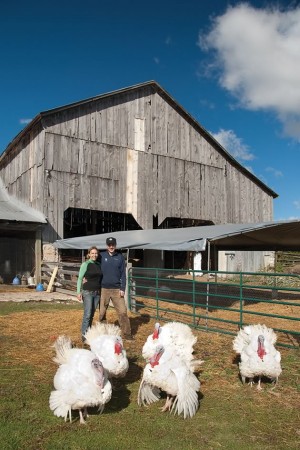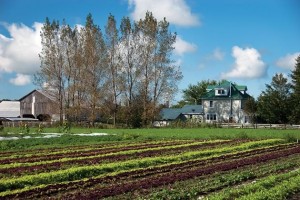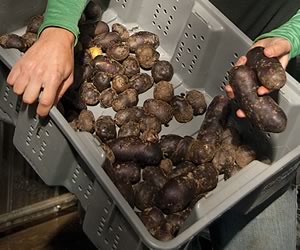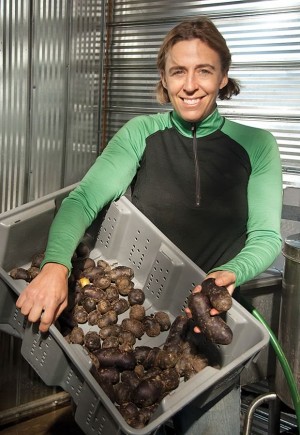The New Farmer
From big city to back forty, an urban couple leaves the world of cappuccino and concrete for a better life … on the farm.
What if you pull your aging station wagon into the parking lot at your local farmers’ market and a sleek black Mercedes slides in beside you? Out hops the farmer who sells you those delicious carrots and mixed greens. His face is sunburned and freckled; there is dirt wedged into his cracked, work-worn hands, so he’s a farmer all right. But a Mercedes? Shouldn’t he be driving a mud-splattered pickup? No wonder those carrots cost so much.
Now imagine it was your lawyer or financial advisor who jumped out of that shiny car. Would you resent his or her success?

Brent Preston and Gillian Flies “The goal is to make the farm a closed system. We want to prove that a small diverse farm can be profitable.” Photos MK Lynde
Changing the “must-be-destitute” view of farmers and farming is part of what Gillian Flies and Brent Preston want to do. The couple, who gave up successful – and well-paid – careers in the city to become farmers, aren’t particularly interested in driving a Mercedes. They simply want farming to allow them to send their kids to university, take a vacation, go out for dinner once in a while. And what’s wrong with that?
Currently, the margins for Gillian’s and Brent’s organic farming venture – The New Farm near Creemore – are so tight that they won’t be trading their pickup for a Mercedes anytime soon. In fact, to make ends meet, Gillian works as a management consultant during the winter and Brent earns a small salary now that he has been elected to the Clearview Township council. And they are not alone. The need to supplement income is common on farms across the country.
Despite their financial challenges, however, these university-educated 40-somethings donate food to The Stop food bank in Toronto as well as local charities. They belong to a new breed of farmer: environmentally conscious, latte-drinking oenophiles who happen to love digging in the dirt and feeding their kids the freshest, healthiest food available.
When I first met the couple, the late-afternoon July sun beat down on us as we toured their pancake-flat fields. “We started out planting about 100 different crops. Now we’re down to 40,” explained Brent. “We took a hard look last year at what we grew, what it cost and what sold.” They gave up onions and kale, and reduced their varieties of heritage tomatoes. Now they sell virtually all of the salad greens, beets, carrots, potatoes, tomatoes, cucumbers, radishes, zucchini, broccoli, beans, peas and salad turnips that they grow.
And just as their list of produce has changed, the market for their vegetables has evolved too. When the couple began farming in 2007, they sold any produce they couldn’t eat themselves at the Creemore Farmers’ Market on Saturday mornings. Two years later, swank Toronto restaurants purchase 40 per cent of what they grow and Brent’s salad turnips, which are served at Marben restaurant on Wellington Street, have become the culinary talk of the town.
In 2010, their market expanded again. The demand for their goods in Collingwood’s restaurants caught up to Toronto when a local distributor, Sanfilippo, came along. “Sanfilippo,” Brent explained, “bought samples of our vegetables, took them to the chefs in Collingwood’s restaurants, told them that this local produce could replace what they were now buying from California, and then clinched the deal by charging them four times as much as the chefs had been paying.”

Brent and Gillian cultivate a total of 12 acres – but only half of those in any given year. The other six get 12 months off to recuperate. Photos MK Lynde
But the chefs aren’t complaining. As Jeremy Korten, the executive chef at Oliver & Bonacini at Blue Mountain, told me, “Brent respects food. Their arugula is amazing and their greens are awesome.”
With dusty brown suntans on their work-lean frames, Gillian and Brent are clear about what they are trying to accomplish beyond affording a vacation. “The goal is to make the farm a closed system,” said Brent. “We want to prove that a small diverse farm can be profitable.”
This means minimizing farm inputs. Their fertilizer is produced mostly by a few chickens, ducks and a pig that poke around in open pens. Their pig arrived from über-chef Michael Stadtländer, in exchange for cabbages. They buy diesel for the tractor, but use as little as possible. And they apply organic soil amendments to replace the nutrients that leave the farm in their vegetables. Gillian reminded me, “You are what you eat, and what you eat eats.”
Cover crops are their preferred method for building up the soil. As we walked by what looked like an empty field, Gillian pointed to tiny shoots of rye grass that will be ploughed back to enrich the soil at the end of the season. They cultivate a total of 12 acres – but only half of those in any given year. The other six get 12 months off to recuperate – a practice once common, but largely replaced in “modern” times by the addition of chemical fertilizers.
The science with which they grow, the panache that characterizes the marketing of their goods, and their commitment to health, the environment and social good comes in part from their eclectic backgrounds.
Gillian grew up in Vermont, which, she says, is miles ahead of Ontario in its commitment to local food. Her father ran the New England Culinary Institute and she studied mathematics at the state university. Gillian spent years working in developing countries, mostly in Africa. “I met Brent when he picked me up at the airport in Malawi.” They soon paired up, but after almost 10 years, they were both disillusioned with the foreign-aid business and decided to move “home.” They chose Toronto because Brent’s family was there and, quipped Gillian, “because Bush was President.”
Soon they’d set up shop in downtown Toronto; Gillian was consulting and Brent, who has a geography degree from McGill, was producing the CBC-TV show CounterSpin. But after the arrival of a son, Foster, who is now almost 10, and a daughter, Ella, who is nearly eight, the country beckoned. For $315,000 they bought a fixer-upper of a house and 100 acres of prime farm land. They decided to pursue organic farming after visiting a similar establishment in Quebec.
How many people, I asked, warned them against such a crazy venture? “Everyone,” admitted Gillian, “except my parents.”
After touring the farm, we sipped cold lemonade from glasses that were sweating in the July heat. We watched their seven interns toiling away. Brent admitted, “The hardest thing to learn has been to control the stress.”
When I visited again, this time in December when a foot of fresh snow blanketed the farm’s new solar installations, the couple were happy to report that income from a bumper crop would cover their winter expenses. “We had a good year,” Brent explained.
But the war is certainly not won. The Toronto market for their produce is steady, but it’s not growing. And they have been dumbstruck by peoples’ reluctance to pay for quality. “We have to stop subsidizing bad food,” Brent warned. “We have this crazy addiction to cheap food.”
But perhaps even more important than the price factor, is time. People don’t take time to prepare food. He told me that the beets they donate to the food bank often go unclaimed because, unlike carrots, they have to be cooked. He said he’s heard that breakfast cereal sales are slumping because cereal isn’t convenient enough – you can’t eat it while driving your car.
Although it’s been slow, there has been progress for local food. The Ontario government has been handing out money to help small producers market their goods and has an aggressive program aimed at getting institutions such as universities and hospitals to source their food locally. But even this is difficult, given that many other policies conspire against local food. For example, Brent explained, the hospital in Barrie agreed to buy and serve local potatoes until it discovered that peeling potatoes was not included in the kitchen staff’s collective agreement.
Despite the challenges and regardless of the irony of upscale urbanites who find organic carrots too expensive, Gillian insisted, “We want to be part of the solution.” And although on that July day she looked drained by the midsummer heat, her skin was clear and her eyes shone. Brent added, “This is the first time in my life that I could see doing a job for the next 20 years.”
The New Farm Produce from The New Farm is available at the Creemore Farmers’ Market on Saturdays from 8.30 am to 12.30 pm from Victoria Day to Thanksgiving. For more information visit thenewfarm.ca.
Related Recipes

Gillian’s Potato Salad
May 10, 2011 | | FoodGillian’s heirloom potatoes from The New Farm are perfect for her potato salad.







